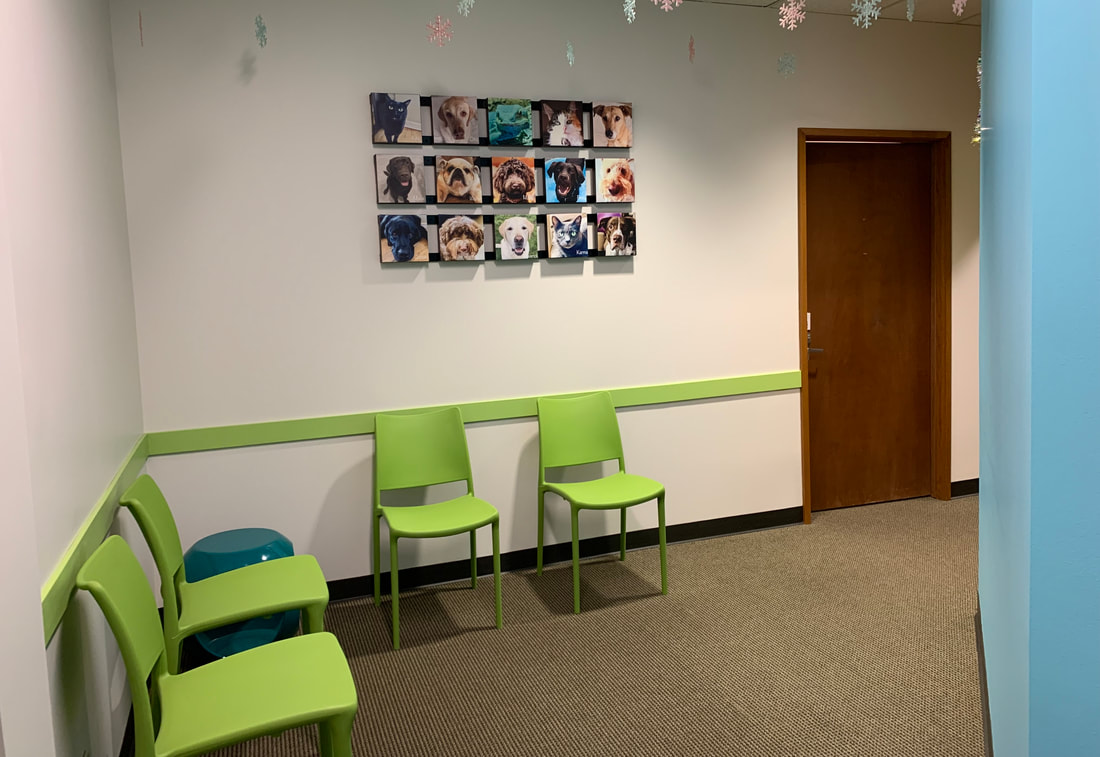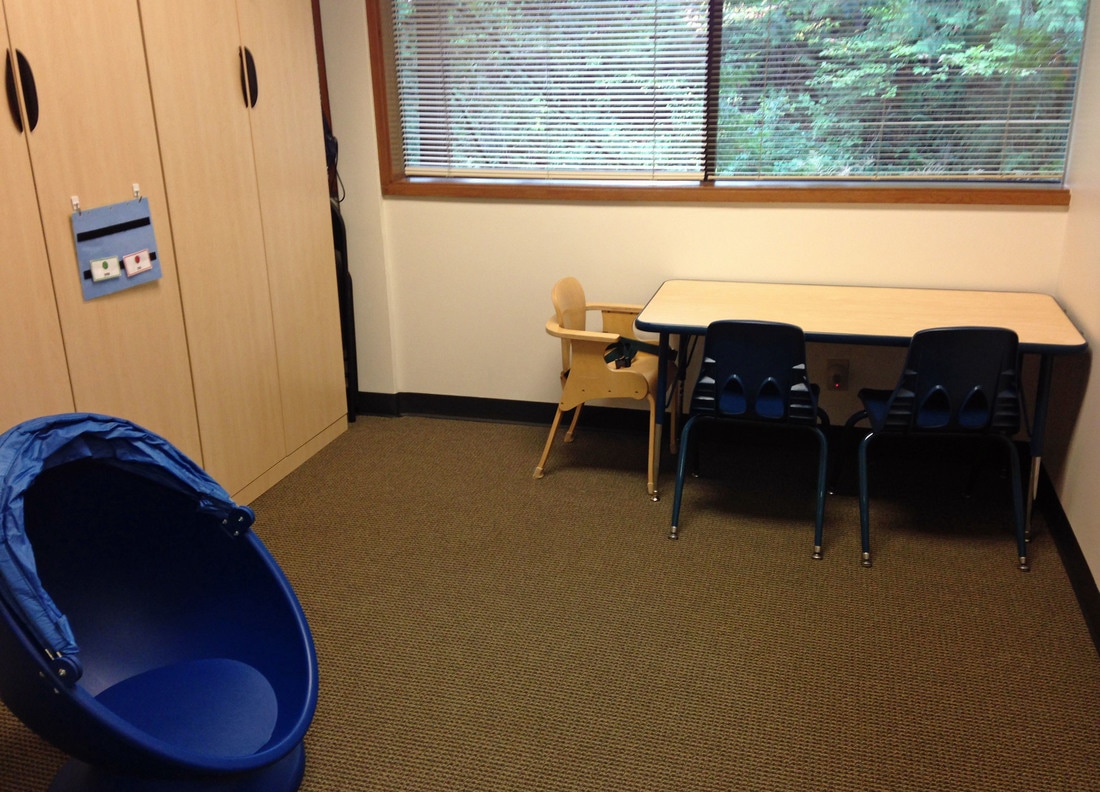Who provides speech-language therapy?
Speech-Language Pathologists (SLPs), also referred to as speech therapists, are professionals educated in the study of communication, its development, and its disorders. All of our SLPs have a master’s degree and state license as well as a certificate of clinical competence from the American Speech-Language-Hearing Association (ASHA).
What might a typical speech-language therapy session look like?
Speech therapists work with children from birth to age 21 and their families on an individual, one-to-one basis, to overcome or improve upon specific communication difficulties. Therapy activities are tailored to the developmental level and interests of the child. Older children targeting specific speech-language goals may work with arts and crafts or board games to learn new skills. For younger children, therapy sessions are centered around interest-based play activities with interactions structured by the individual therapist to meet specific goals. Regardless of the age, developmental level, or specific needs, we want your child to feel comfortable and enjoy his or her time in therapy. Children who are at ease and feel successful are more receptive to learning new skills.
How long will my child need therapy?
Speech-language therapy is a process. Since every child is unique and outcomes vary, it is impossible to estimate the duration of therapy that will be required. Some children are graduated after a few months, while others receive services for years.
Will parents be allowed in the therapy room?
Our goal is not only to teach your child new communication skills but also to educate parents in supporting new skills at home. Parents are encouraged to observe and participate in the therapy session. Your speech-language pathologist will provide detailed explanations about specific goals for the session, your child’s performance, and methods to encourage growth at home. Additionally, questions can be addressed immediately during the session.
Can siblings come too?
While we love to meet brothers and sisters, it is best to find alternate arrangements for siblings if you plan to join your child during the evaluation and therapy sessions.
_____________________________________________
What to Expect
Once your child’s evaluation or initial therapy session has been scheduled, your speech-language pathologist will ask you to provide any pertinent history including past evaluations and treatment plans. These will help your clinician plan the first session appropriately.
When you arrive, you will be greeted promptly by your clinician. Your child can become comfortable with the environment while playing with toys in the waiting area. Here, parents will be asked to complete intake forms and a developmental questionnaire (unless brought to the session or sent ahead of time), and your insurance card and license will be copied. Copays will be collected at this time as well.
When your child is ready, your clinician will escort you and your child to a treatment room where additional toys and activities have been prepared. Both formal and informal evaluation procedures may be used. Informal evaluation procedures may include observing your child at play and how s/he interacts with adults. A speech sample or language sample may be recorded as well. Formal measures may include standardized tests which ask your child to point to pictures, follow instructions, name pictures, etc. It is best for parents to remain neutral and not support the child during standardized testing which can invalidate the results. At the end of the evaluation session, the SLP will discuss results and share basic impressions. You may wish to have your child wait in another room during feedback, discuss results over the phone, or meet at a different time without your child. Your clinician will document all of the information in an Evaluation Report for your records.
During the first few sessions, a thorough treatment plan for therapy will be developed and provided to parents. Parents’ input is valuable in identifying appropriate goals. Therapy sessions may be weekly or twice weekly, depending on need and schedule. Individual activities, both structured and informal, will be prepared to address treatment plan goals. The therapy environment and activities are designed to foster growth by allowing success while supporting development to the next level.
We understand that children can be unpredictable. While we prepare specific activities for each session, we are flexible and able to adapt to a child’s mood or specific needs on any given day.
Speech-Language Pathologists (SLPs), also referred to as speech therapists, are professionals educated in the study of communication, its development, and its disorders. All of our SLPs have a master’s degree and state license as well as a certificate of clinical competence from the American Speech-Language-Hearing Association (ASHA).
What might a typical speech-language therapy session look like?
Speech therapists work with children from birth to age 21 and their families on an individual, one-to-one basis, to overcome or improve upon specific communication difficulties. Therapy activities are tailored to the developmental level and interests of the child. Older children targeting specific speech-language goals may work with arts and crafts or board games to learn new skills. For younger children, therapy sessions are centered around interest-based play activities with interactions structured by the individual therapist to meet specific goals. Regardless of the age, developmental level, or specific needs, we want your child to feel comfortable and enjoy his or her time in therapy. Children who are at ease and feel successful are more receptive to learning new skills.
How long will my child need therapy?
Speech-language therapy is a process. Since every child is unique and outcomes vary, it is impossible to estimate the duration of therapy that will be required. Some children are graduated after a few months, while others receive services for years.
Will parents be allowed in the therapy room?
Our goal is not only to teach your child new communication skills but also to educate parents in supporting new skills at home. Parents are encouraged to observe and participate in the therapy session. Your speech-language pathologist will provide detailed explanations about specific goals for the session, your child’s performance, and methods to encourage growth at home. Additionally, questions can be addressed immediately during the session.
Can siblings come too?
While we love to meet brothers and sisters, it is best to find alternate arrangements for siblings if you plan to join your child during the evaluation and therapy sessions.
_____________________________________________
What to Expect
Once your child’s evaluation or initial therapy session has been scheduled, your speech-language pathologist will ask you to provide any pertinent history including past evaluations and treatment plans. These will help your clinician plan the first session appropriately.
When you arrive, you will be greeted promptly by your clinician. Your child can become comfortable with the environment while playing with toys in the waiting area. Here, parents will be asked to complete intake forms and a developmental questionnaire (unless brought to the session or sent ahead of time), and your insurance card and license will be copied. Copays will be collected at this time as well.
When your child is ready, your clinician will escort you and your child to a treatment room where additional toys and activities have been prepared. Both formal and informal evaluation procedures may be used. Informal evaluation procedures may include observing your child at play and how s/he interacts with adults. A speech sample or language sample may be recorded as well. Formal measures may include standardized tests which ask your child to point to pictures, follow instructions, name pictures, etc. It is best for parents to remain neutral and not support the child during standardized testing which can invalidate the results. At the end of the evaluation session, the SLP will discuss results and share basic impressions. You may wish to have your child wait in another room during feedback, discuss results over the phone, or meet at a different time without your child. Your clinician will document all of the information in an Evaluation Report for your records.
During the first few sessions, a thorough treatment plan for therapy will be developed and provided to parents. Parents’ input is valuable in identifying appropriate goals. Therapy sessions may be weekly or twice weekly, depending on need and schedule. Individual activities, both structured and informal, will be prepared to address treatment plan goals. The therapy environment and activities are designed to foster growth by allowing success while supporting development to the next level.
We understand that children can be unpredictable. While we prepare specific activities for each session, we are flexible and able to adapt to a child’s mood or specific needs on any given day.


